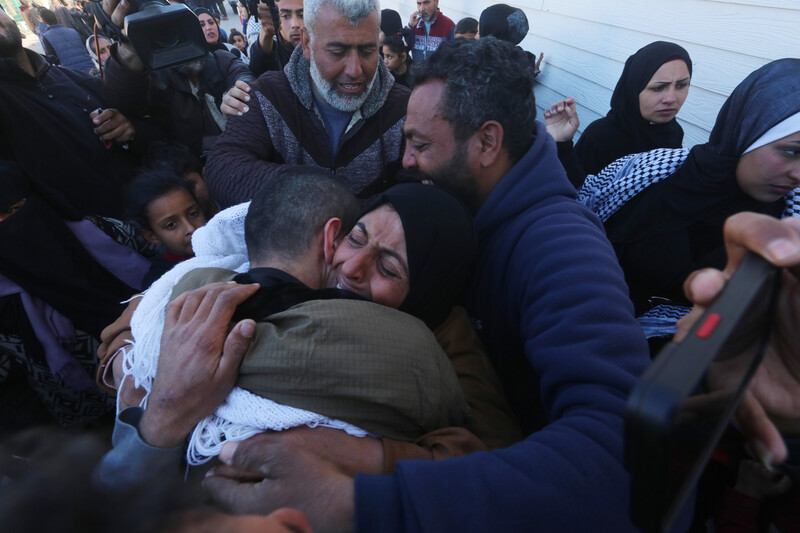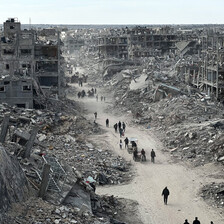The Electronic Intifada 2 June 2025

Relatives welcome home Palestinian detainees, freed as part of a prisoner exchange with Israel on 27 February, 2025.
APA imagesPalestinian detainees in Israeli prisons face not only intolerably abusive conditions but also systemic medical neglect, worsening their physical and mental health.
In interviews with The Electronic Intifada, former detainees described harrowing experiences that reflect a pattern of deliberate denial of basic healthcare, a situation that has worsened since 7 October, 2023.
Adel Sobeih, 21, was detained from a hospital bed on 20 March 2024.
At the time, he was a patient at al-Shifa hospital, where he was receiving treatment for a leg wound sustained in the so-called flour massacre in February 2024.
But on 18 March 2024, Israeli troops surrounded the hospital and began systematically rounding up patients and staff.
“Soldiers forced everyone – including patients – into the hospital yard,” Adel told The Electronic Intifada. “They made us strip and walk toward them. I was slow because of my injury, but they didn’t care. They beat my injured leg until it started bleeding.”
The abuse didn’t stop there.
“I was loaded onto a military truck where soldiers,” he said, “extinguished cigarettes on my body.”
By the time Adel reached the Sde Teiman detention camp, he had lost consciousness from the torture.
At the Sde Teiman clinic, a “doctor slapped me and muttered something in Hebrew.”
Adel’s wound was treated, and he was told he would be taken to hospital.
“When I woke up at the hospital, a doctor told me they were going to amputate my leg. I signed a form under pressure that I agreed to the surgery, and waived the right to a blood transfusion.”
After the operation, which saw him lose his leg to above the thigh, they mocked him.
“They said, ‘We took your leg,’ and laughed. That same day, they transferred me back to Sde Teiman.”
Adel spent two and a half months in detention, during which he endured repeated beatings and remained cold throughout as he was often kept naked except for a diaper.
“I lived 44 days in hell.”
Deliberate abuse
Asmaa Harish, a freelance journalist from Ramallah, was detained for six months between April and October 2024.
She was held without charge or trial in administrative detention, which Israel can extend indefinitely.
Asmaa told The Electronic Intifada that during her time in incarceration, she not only experienced medical neglect, but also lost a lot of weight and suffered from food poisoning and malnutrition.
“The neglect was intentional – just like the starvation policy. It severely affected our physical health. I lost 20 kilograms in six months.”
No effective pain killers were provided for menstrual pain, and cheap sanitary towels caused skin irritation and infections. Combined with the little and poor quality food they were given, many inmates began suffering irregular periods, with some bleeding heavily every two weeks and others not menstruating at all.
“When we were in pain, they refused to take us to the clinic,” Asmaa told The Electronic Intifada. “They just gave us Acamol [paracetamol]. In six months, I was allowed to see a doctor only once. We were 97 detainees aged between 17 and 70.”
The health of those with hypertension and diabetes simply got worse, she said. Others who were healthy when first detained developed severe fatigue, dizziness and psychological issues – “especially mothers separated from their children.”
“There were pregnant detainees, but they weren’t given special care or even decent food. One woman developed gestational diabetes without receiving any treatment.”
Medical appointments required court orders and could take weeks. Even when approved, getting to the clinic meant being blindfolded and shackled. The doctors communicated only in Hebrew and undertook examinations in front of a guard.
“There was no privacy,” Asmaa said.
In general, the prison was dirty and infested with bugs. Detainees were not given any proper shampoo, again causing skin irritations. And no one had hairbrushes.
“We combed our hair with forks.”
22 years
According to the Commission of Detainees and Ex-Detainees Affairs, the policy of medical neglect has dramatically worsened since 7 October.
In a statement, the Commission accused Israeli prison authorities of using medical neglect as a form of revenge against Palestinian detainees. Even those with chronic illnesses or severe injuries are routinely denied medication and proper care.
Several prisoners have died as a result, and many more may be at risk as these violations continue.
But while conditions have significantly deteriorated over the past 19 months, medical neglect was a routine practice even before.
Osama Abu al-Asal was detained at 27 on 4 June 2003. He was released on 1 February, 2025, as part of the prisoner swap during the brief two-month ceasefire earlier this year. Now 49, he spent 22 years in Israeli prison.
“I entered prison healthy and left with chronic illnesses,” Osama told The Electronic Intifada.
Just three years after incarceration, Osama’s health began to deteriorate due to the conditions.
“I started feeling unexplained pain and discomfort,” Osama said. “It was difficult to see a doctor. And when I finally did, they would only give me a single Acamol pill without any proper check-up.”
In 2017, Osama experienced severe chest pain and was transferred to Soroka Medical Center.
He was diagnosed with chronic hypertension and later underwent heart surgery.
“During the surgery, the doctors requested that the guards unshackle me, but they refused,” Osama said. “I remained shackled for five days in the hospital. I wasn’t even allowed to go to the bathroom. They gave me a bucket instead. I wasn’t treated like a human being.”
He was denied heart medications or any treatment for his chronic hypertension. A year later, he was also diagnosed with diabetes. The doctor informed him that he had likely had the disease for some time – something that went unnoticed due to the lack of regular checkups.
“I started needing insulin injections, but the prison authorities gave me only one dose a day instead of the required three,” he said. “They don’t want you to get better. They just don’t want you to die either.”
After 7 October, the situation worsened drastically.
“All medications were withdrawn, even for chronic patients. Medical tests were halted. We were deliberately starved. We weren’t allowed to bathe and water was cut off. Our hygiene deteriorated, and many prisoners developed skin diseases, weakness and dizziness.
Osama lost 22 kilograms in prison after October 2023 and contracted scabies.
“They would raid our cells with dogs, beat us with electric batons – no distinction between healthy or sick,” he said. “The prison became a slaughterhouse.”
Fedaa al-Qedra is a journalist in Gaza.





